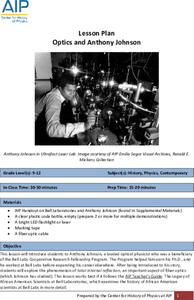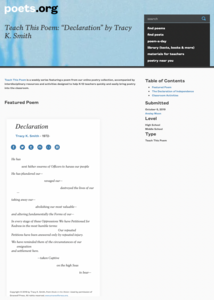Academy of American Poets
Teach This Poem: "When Fannie Lou Hamer Said" by Mahogany L. Browne
After watching an excerpt from a video of Fannie Lou Hamer's testimony before Congress, pupils do a close reading of Mahogany L. Browne's poem "When Fannie Lou Hamer Said," annotate words and phrases that draw their attention and list...
National Endowment for the Humanities
Harriet Tubman and the Underground Railroad
While many have heard of Harriet Tubman, few are aware of the many ways this remarkable woman was involved in the United States Civil War, the abolitionist movement, and the Underground Railroad. Young historians examine primary source...
National Endowment for the Humanities
African-American Communities in the North Before the Civil War
Middle schoolers may be surprised to learn that before the American Civil War there were more slaves living in New York than there were in Kentucky! Young historians examine maps and census data to gather statistics about...
National Endowment for the Humanities
Toni Morrison's Beloved: For Sixty Million and More
Complex, disturbing, and challenging, Beloved is the focus of a lesson that provides three activities to guide a close reading of Toni Morrison's novel. Readers create chapter titles based on key plot elements or themes, identify...
Learning for Justice
Mary McLeod Bethune
Young historians conduct a close reading of the text of an interview with Mary McLeod Bethune, the daughter of former slaves who taught herself to read, grew up to establish schools for other Black women, and went on to become an advisor...
American Institute of Physics
The Physicist's War: Dr. Herman Branson and the Scientific Training of African Americans during World War II
The mobilization of soldiers for World War II resulted in a worker shortage in the defense industries, especially in the fields of physics and other sciences. The Engineering, Science, and Management War Training program (ESMWT) was...
K20 LEARN
Analyzing The "I Have A Dream" Speech
The famous words of Martin Luther King still resonate with scholars today. An enlightening instructional activity helps pupils examine the "I Have a Dream" speech in more depth and learn what impact it had on the civil rights movement....
K20 LEARN
Plantation Life And Slavery: Antebellum Era
Learners evaluate primary sources from the antebellum era to determine the accuracy of textbooks. They examine narratives from enslaved people, then compare them to their own text. Extension activities include the opportunity to write a...
Learning for Justice
Mary Church Terrell
Excerpts from an 1898 speech by civil rights activist Mary Church Terrell offers young scholars an opportunity to investigate how Black American women fought for civil rights long before Rosa Parks and the civil rights movement of the...
DocsTeach
Fannie Lou Hamer and Voting Rights
To understand the challenges Black voters faced in Mississippi, middle schoolers first gather background information about Fannie Lou Hamer and then read her testimony given during the 1964 Democratic Nation Convention. After a...
National Woman's History Museum
Ida B. Wells: Suffragist and Anti-Lynching Activist
Suffragette, investigative journalist, and civil rights activist Ida B. Wells is the focus of a lesson that has young historians study the work of this amazing woman. Scholars watch a video biography of Wells, read the text of her speech...
American Institute of Physics
The Physical Sciences at Historically Black Colleges and Universities
The history of science instruction at Historically Black Colleges and Universities (HBCUs) is the focus of a instructional activity that explores the early challenges these institutions faced in accessing equipment for their labs and...
American Institute of Physics
Optics and Anthony Johnson
Message sending has come a long way since the days of Morse code's dots and dashes. Young scientists study the research of optical physicist Anthony Johnson and his work in fiber optics, lasers, and the principle of total internal...
American Institute of Physics
Historical Detective: Edward Alexander Bouchet and the Washington-Du Bois Debate over African-American Education
Young scientists meet Edward Alexander Bouchet who, in 1876, was the first African American to receive a PhD in Physics. This two-part lesson first looks at the debate between Booker T. Washington and W.E.B. Du Bois about the type of...
American Institute of Physics
African Americans and Life in a Secret City
Imagine the lure of being offered a job at a secret site, working on a secret project, and earning higher wages! Such was the approach used to recruit African Americans to Hanford, Washington, one of several sites used to develop...
American Institute of Physics
African Americans in Astronomy and Astrophysics
A two-part lesson focuses on the contributions to the fields of astronomy and astrophysics of two African Americans: Benjamin Banneker and Dr. George Carruthers. In part one, scholars learn about Benjamin Banneker by examining his...
Academy of American Poets
Teach This Poem: “Declaration” by Tracy K. Smith
Tracy K. Smith's erasure poem "Declaration" challenges scholars to use their noticing skills to make connections between an engraving entitled "The Declaration of Independence" and Smith's poem. Class members record observations and...
K20 LEARN
LBJ and Voting Rights
Challenges to voting rights is not a new thing. Using President Lyndon B. Johnson's 1965 "The American Promise" speech on voting rights as a starting point, young historians research current voting rights laws and challenges.
Academy of American Poets
Teach This Poem: "On Being Brought from Africa to America" by Phillis Wheatley
Phillis Wheatley's poem, "On Being Brought from Africa to America" is the focus of a lesson that asks readers to consider how the poem is a critique of slavery. Groups comprise a list of words and phrases they notice as well as questions...
American Institute of Physics
The Black Scientific Renaissance of the 1970s-90s: African American Scientists at Bell Laboratories
A two-part instructional activity asks young scientists to research the contributions of African American scientists at Bell Laboratories. After presenting their findings, class members watch two demonstrations that introduce them to...
American Institute of Physics
African Americans and the Manhattan Project
A lesson plan about the Manhattan Project will explode young physicists' understanding of the racial attitudes in the United States during and after World war II. Groups select an African American scientist or technician that worked on...
American Institute of Physics
African American Inventors in History
A two-part lesson introduces young historians to the work of famous African American inventors. Groups first research and develop a presentation of an inventor that includes biographical information and information about one of their...
American Institute of Physics
When Computers Wore Skirts: Katherine Johnson, Christine Darden, and the “West Computers”
Did you know that people, known as computers, performed the complex calculations that are now done by electronic computers? Three of these human computers, Katherine Johnson, Christine Darden, and Melba Roy Mouton are featured in a...
University of California
Was Slavery Always Racial?
The lesson focuses on slavery in the ancient world and asks academics to decide if it was always about race. Scholars view primary sources, participate in a short discussion, and complete a worksheet to understand how slavery in the...

























